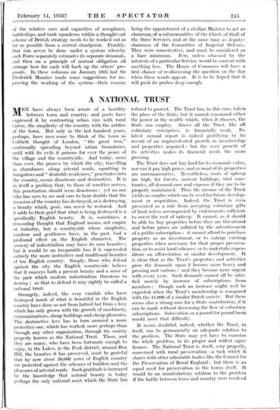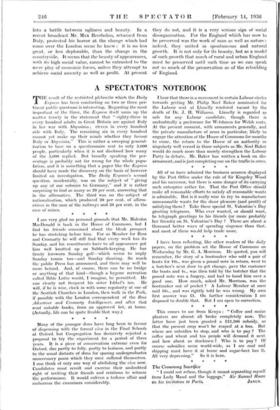A NATIONAL TRUST
MEN have always been aware of a hostility between town and country, and poets have ( xpressed. it by contrasting urban vice with rural virtue, the simplicity of the country with the artifice of the town. But only in the last hundred years; perhaps, have men come to think of the town as (obbett thought of London, " the great wen," continually spreading beyond urban boundaries, until with its evils it poisons for ever the peace of the village and the countryside. And today, more than ever, the process by which the city, travelling in charabancs along arterial roads, squatting in bungalows and " desirable residences," penetrates into the country, seems disastrous and destructive. It is in itself a problem that, to those of sensitive nerves, this penetration should seem disastrous : yet no one who has eyes to see and cars to hear doubts that the invasion of the country has destroyed, or is destroying, a beauty which, gone, can never be restored. And it adds to their grief that what is being destroyed is a specifically English beauty. It is, sometimes,: a reassuring thought that England means, not empire or industry, but a countryside whose simplicity, candour and gentleness have, in the paSt, had a profound effect on the English character. The scenery "Of industrialism may have its own beauties ; but it would be an irreparable loss if it superseded entirely the more instinctive and traditional beauties of the English country. Simply, those who defend against the city the English countryside believe that it conveys both a present beauty and a sense of the past which modern industrialism threatens to destroy: so that to defend it may rightly be called a national trust.
Strangely, indeed, the very vandals who have destroyed much of what is beautiful in the English, country have done so not from hatred but from a love which has only grown with the growth of machinery, communications, cheap buildings and cheap pleasures. This destructive love has in turn aroused a more protective one, which has worked, more perhaps than through any other organisation, through the society properly known as the National Trust. Those, and they are many, who hive been fortunate enough to enjoy,. in the Lakes, in the Peak district, around Box Hill, the beauties it has preserved, must be grateful that by now about 50,000 acres of English country are protected against the schemes of builders and the pleasures of arterial roads. Such "gratitude isincreased by the knowledge that natural beauty is today. perhaps the only, national asset which the Statc has • - - refused to protect. The Trust has, in this case, taken the place of the State, but it cannot command either the power or the wealth which, when it chooses, the State can employ. Above all the Trust, like all voluntary enterprises, is financially weak. Its latest annual report is indeed gratifying in its record of an unprecedented growth in membership and properties acquired : but the very growth of its activities makes its financial needs the more pressing.
The Trust does not buy land for its economic value, nor can it pay high prices, and so most of its properties are unrcmunerative. Nevertheless, costs of upkeep are high, for forests, ancient buildings, bird sanc- tuaries, all demand care and expense if they arc to be properly maintained. Thus the income of the Trust yields no surplus which can be used for future develop- ment or acquisition. Indeed, the Trust is even prevented as a rule from accepting voluntary gifts of land unless accompanied by endowments sufficient to cover the cost of upkeep. It cannot, as it should be able to, buy properties before they arc threatened and before prices arc inflated by the advertisement of a public subscription : it cannot afford to purchase property as an investment, or to enlarge existing properties when necessary for their proper preserva- tion, or to assist local schemes, or to undertake expen- diture on afforestation or similar development. It is clear that as the Trust's properties and activities grow the demands upon it become more heavy and pressing and various : and they become more urgent with every year. Such demands cannot all be sails- fled merely by increase of subscriptions from members : though such an increase might well be expected when the Trust's membership is compared with the 11,000 of a similar Dutch society. But there seems also a strong ease for a State contribution, if it can be made without decreasing the flow of voluntary subscriptions. Subvention on a pound for pound basis would meet that difficulty.
It seems doubtful, indeed, whether the Trust, in itself, can be permanently an adequate solution to the problem. The State may yet have to examine the whole problem, in its proper and widest signi- ficance. The National Trust is itself, very properly, concerned with rural preservation—a task which it shares with other admirable bodies like the Council for the Preservation of Rural England : but there is an equal need for preservation in the towns itself. It would be an unsatisfactory. solution to the problem if the battle between town and country were resolved into a battle between ugliness and beauty. In a recent broadcast Mr. Max Beerbohm, returned from Italy, protested his horror at the change which had come over the London scene he knew : it is no less great, or less deplorable, than the change in the countryside. It seems that the beauty of appearances, with its high social value, cannot be entrusted to the mere play of economic forces, unless they attempt to achieve social amenity as well as profit. At present they do not, and it is a very serious sign of social disorganisation. For the England which has now to be preserved was the work of man as well as nature : indeed, they united in spontaneous and natural growth. It is not only for its beauty, but as a model of such growth that much of rural and urban England must be preserved until such time as we can speak not so much of the preservation as of the rebuilding of England.















































 Previous page
Previous page